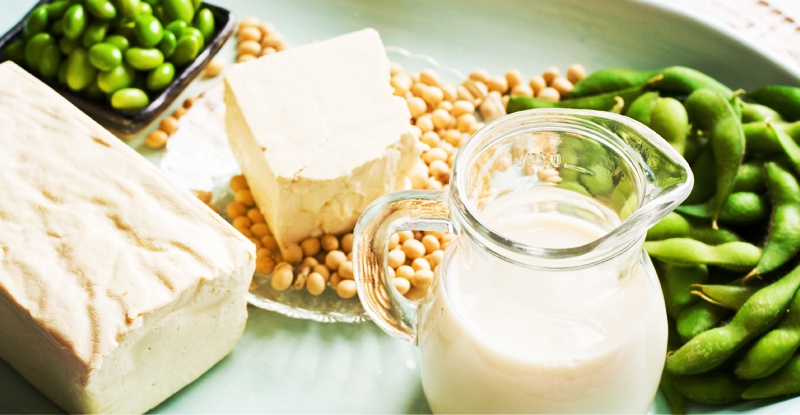Soy: The Controversial Bean
There’s so much controversy surrounding soy, so let’s take a closer look at the evidence and what it all means.
A brief history of soy
The soybean is a species of legume that is native to East Asia. The origins of cultivation are widely disputed, and occurred well before written records. The earliest evidence of soybean domestication is in China, between 7000 and 6600 BCE, and a little later in Japan and Korea. Soy was a crucial crop in these countries. Traditionally, it has been used in both fermented and non-fermented applications: soy sauce, fermented bean paste, natto, tempeh, soy milk, and tofu to name a few. And while the origins of the plant and its cultivation remain murky, we do know that the soybean started making its way to other countries such as India, Vietnam, and Burma through trade around the first century CE.
North America got the soybean in 1765, when a sailor with the East India Company visited China and brought some back. For the next century and a half, soy was grown primarily as forage for animals until a couple of chemists showed the nutritional value of the bean could be increased by cooking. The United States now accounts for 32 percent of global soy production.
Soy what’s all the fuss?
Proponents of soy claim consuming it can decrease one’s risk of heart disease, diabetes, and hormonal cancers (like breast cancer). Detractors claim consuming soy increases one’s risk of developing breast cancer, thyroid diseases, and fertility problems in both men and women.
Both arguments come down to a component of soy called isoflavones. Isoflavones are a class of phytoestrogens — a group of naturally occurring, nonsteroidal plant compounds that are structurally similar to the hormone estrogen. Therein lies the controversy: Do isoflavones have estrogenic effects, and if they do, are those effects good or bad for us?
There’s plenty of passion on both sides of this debate. Luckily, soy has become one of the most researched foods out there, with more than 2,000 articles published every year!
Soy and cancer
Cancer is usually the most frequently cited concern from people who ask about it, so we’ll start there. Some of the earliest studies conducted on soy suggested that genistein, which is one of the primary isoflavones in soy, increased the risk of breast cancer, specifically estrogen receptor-positive tumors. These studies were preliminary, and done in mice. In 2011, however, it was shown that mice and humans metabolize genistein very differently. Some types of mice are unable to metabolize isoflavones effectively, and were shown to have up to 150 times the amount of genistein concentrations in their blood than the highest concentration observed in human subjects.1 This study casts doubt on the usefulness of conducting soy-related studies on mice, and emphasizes the importance of using human studies to draw meaningful conclusions.
Subsequent human studies have been conducted, and have found women who consume more than two servings of soy per day have the lowest incidence of breast cancer.2, 3 Among breast cancer survivors, higher isoflavone intake was associated with a lower risk of death.4 There may even be implications for soy in the treatment of breast cancer, as preliminary research suggests it may be able to destroy cancer cells.5 More research will be needed in that area, though.
Soy, and in particular genistein, seems to protect against a variety of other cancers, including prostate cancer; it seems to inhibit tumor growth with no effect on testosterone levels.6, 7 Even uterine fibroids, benign but often causing pain and heavy menstrual bleeding, may be able to be treated with genistein;8 however, these studies were done in vitro, so further research is needed to determine if the findings are consistent in the human body.
Soy and men
Another concern I frequently hear about soy consumption is mostly from men. They have heard that the phytoestrogens in soy will have a so-called “feminizing effect” on them. And the concern is understandable. There were a few case studies that suggested this could happen.9, 10 The first example is of a man who was consuming three quarts (12 cups) of soy milk per day, and the second is of a man consuming multiple types of soy products daily, which amounted to around 360 mg/day of isoflavones — roughly nine times the intake of older Japanese men, who consume soy daily.
Well-designed studies and literature reviews have revealed soy intake at usual amounts to have no effect on physical appearance or male reproductive hormones,11 and support the long-held advice of health care practitioners: too much of anything, even healthy foods, can potentially have adverse effects.
Soy and heart health
The benefits of including soy for heart health are well-documented. Soy was observed to have cholesterol lowering effects as far back as 1967, and corroborated by countless studies and meta-analyses since (one such example cited12). Besides lowering LDL (bad) cholesterol, it also lowers triglycerides and raises HDL (good) cholesterol.12 This is great news, because an estimated 80 percent of people who have high cholesterol respond to dietary treatments. Soy is a great addition to a healthy diet!
Soy has been shown to have positive effects that extend beyond just lowering cholesterol. It seems to have a unique ability to lower blood pressure. In clinical studies, average blood pressure reductions were 2.5 mmHg reduction in systolic pressure (top number), and 1.5 mmHg reduction in diastolic pressure (bottom number). 13, 14, 15, 16 While those numbers may sound modest, the findings are clinically significant because some people may be able to avoid or delay using blood pressure medication with small reductions. Further studies need to be conducted in other areas of heart health, like arterial stiffness, C-reactive protein, and endothelial function; early research is promising but conflicting.
Overall, consumption of soy foods seems to protect the heart in a variety of ways, perhaps most obviously (and non-scientifically) by replacing protein foods in the western diet that are often high in saturated fat and/or cholesterol and devoid of fiber. We know that both of these factors can have a profound effect on cardiovascular risk. However, soy foods do seem to have additional heart-protective qualities that are not yet well understood.
Soy and thyroid health
As far back at the 1930s, studies conducted on rodents suggested that soy may inhibit thyroid function and have stoked fears that soy foods might be bad for thyroid health. Some in vitro studies seem to corroborate that. But neither of those study designs extrapolate well to humans. It is for that reason we use rodent models and in vitro studies as starting points to determine where to concentrate research efforts.
Further research studies done on healthy humans have concluded soy has no detrimental effect on thyroid health.17 There is some concern, however, for individuals who do not have healthy thyroid function. While soy doesn’t affect the thyroid itself, it does seem to inhibit the absorption of some thyroid medications.18 This usually isn’t too much of a problem, since thyroid medication should be taken on an empty stomach, but could be important for some people. Also of note: Infants with congenital hypothyroidism that are being fed soy formula should have their TSH (thyroid stimulating hormone) levels continuously monitored, as it was found the formula may complicate management and lead to prolonged elevated TSH.19
The verdict: Healthy for most
The clear majority of the evidence in this case points to soy not only being safe, but even beneficial for most people to consume. While people with certain medical conditions might want to talk with their doctors about including soy in their diets, most can do so with peace of mind. And while studies show no difference between genetically modified and conventional soy, if that is a concern for you, be sure to choose organic soy products. Organic products, by definition, cannot contain genetically modified ingredients.
Note on whole soy foods versus soy isolates: Most of the studies suggesting soy may be detrimental to health that were not conducted on animals or in vitro have been conducted using soy isolates or other soy derivatives (parts of whole soybeans that have been extracted, isolated, and refined). This illustrates an important point that can be applied across the food spectrum: It is generally better to eat foods in their most whole form rather than refined, processed foods or derivatives.
Resources:
- Setchell KD, Brown NM, Zhao X, et al. Soy isoflavone phase II metabolism differs between rodents and humans: implications for the effect on breast cancer risk.The American Journal of Clinical Nutrition. 2011;94(5):1284-1294.
- Yan-yun Zhu, Lei Zhou, Shun-chang Jiao, et al. Relationship between soy food intake and breast cancer in China. Asian Pacific J Cancer Prev. 2011;12, 2837-2840.
- Baglia, M, Zheng, W, et al. The association of soy food consumption with the risk of subtype of breast cancers defined by hormone receptor and HER2 status. J. Cancer. 2016; 139: 742–748.
- Zhang F, Haslam, D, Terry, M, et al. Dietary isoflavone intake and all-cause mortality in breast cancer survivors: The Breast Cancer Family Registry. Cancer. 2017 Mar.
- Zafar A, Singh S, Naseem I. Cytotoxic activity of soy phytoestrogen coumestrol against human breast cancer MCF-7 cells: Insights into the molecular mechanism. Food Chem Toxicol. 2017 Jan;99:149-161.
- Zhang L, Li L, et al. Genistein inhibits the stemness properties of prostate cancer cells through targeting Hedgehog–Gli1 pathway. Cancer Letters. 2012;323:48–57.
- Hussain M, Banerjee M, Sarkar FH, et al. Soy Isoflavones in the Treatment of Prostate Cancer. Nutrition And Cancer. 2003; 47 , Iss. 2.
- Castro L, Gao X, Moore AB, et al. A High Concentration of Genistein Induces Cell Death in Human Uterine Leiomyoma Cells by Autophagy. Expert Opin Environ Biol. 2016; 5 (Suppl 1).
- Martinez J, Lewi J. An Unusual Case of Gynecomastia Associated with Soy Product Consumption. Endocrine Practice: 2008; 14: 415-418.
- Siepman T, Roofeh J, et al. Hypogonadism and erectile dysfunction associated with soy product consumption. 2011; 27: 859-862.
- Hamilton-Reeves J, Vazquez G, et al. Clinical studies show no effects of soy protein or isoflavones on reproductive hormones in men: results of a meta-analysis. Fertil Steril. 2010; 94(3): 997-1007.
- Zhan S., Ho S.C. Meta-analysis of the effects of soy protein containing isoflavones on the lipid profile. Am J Clin Nutr. 2005; 81: 397–408.
- Hooper L, Kroon PA, et al. Flavonoids, flavonoid-rich foods, and cardiovascular risk: a meta-analysis of randomized controlled trials. Am J Clin Nutr. 2008; 88(1): 38-50.
- Dong JY, Tong X, et al. Effect of soya protein on blood pressure: a meta-analysis of randomised controlled trials. Br J Nutr. 2011; 106(3): 317-26.
- Taku K, Lin N, et al. Effects of soy isoflavone extract supplements on blood pressure in adult humans: systematic review and meta-analysis of randomized placebo-controlled trials. J Hypertens. 2010; 28(10): 1971-82.
- Liu XX, Li SH, et al. Effect of soy isoflavones on blood pressure: a meta-analysis of randomized controlled trials. Nutr Metab Cardiovasc Dis. 2012; 22(6): 463-70.
- Messina M, Redmond G. Effects of soy protein and soybean isoflavones on thyroid function in healthy adults and hypothyroid patients: A review of the relevant literature. Thyroid. 2006; 16: 249–258.
- Bell DS, Ovalle F. Use of soy protein supplement and resultant need for increased dose of levothyroxine. Endocr Pract. 2001; 7(3): 193-4.
- Conrad S, Chiu H, Silverman B. Soy formula complicates management of congenital hypothyroidism. Arch Dis Child. 2004; 89(1): 37-40.




